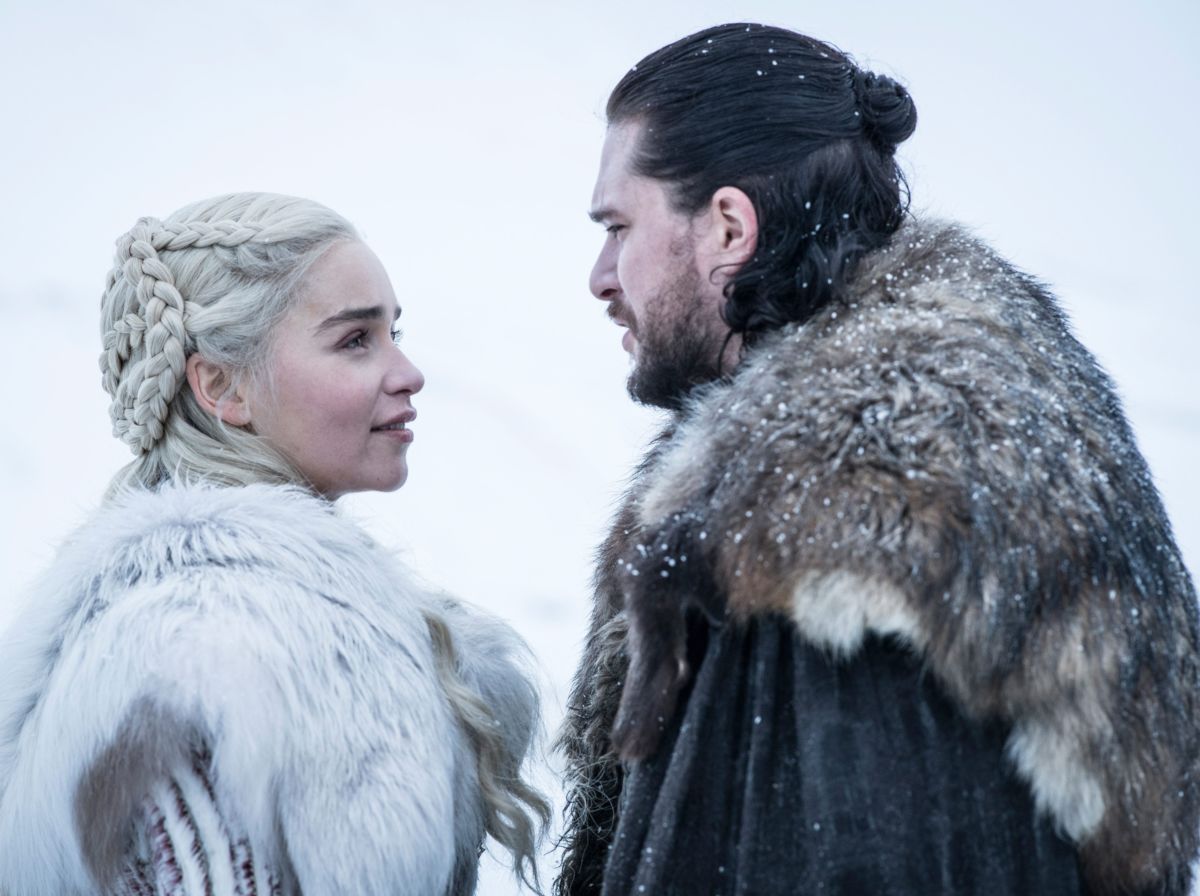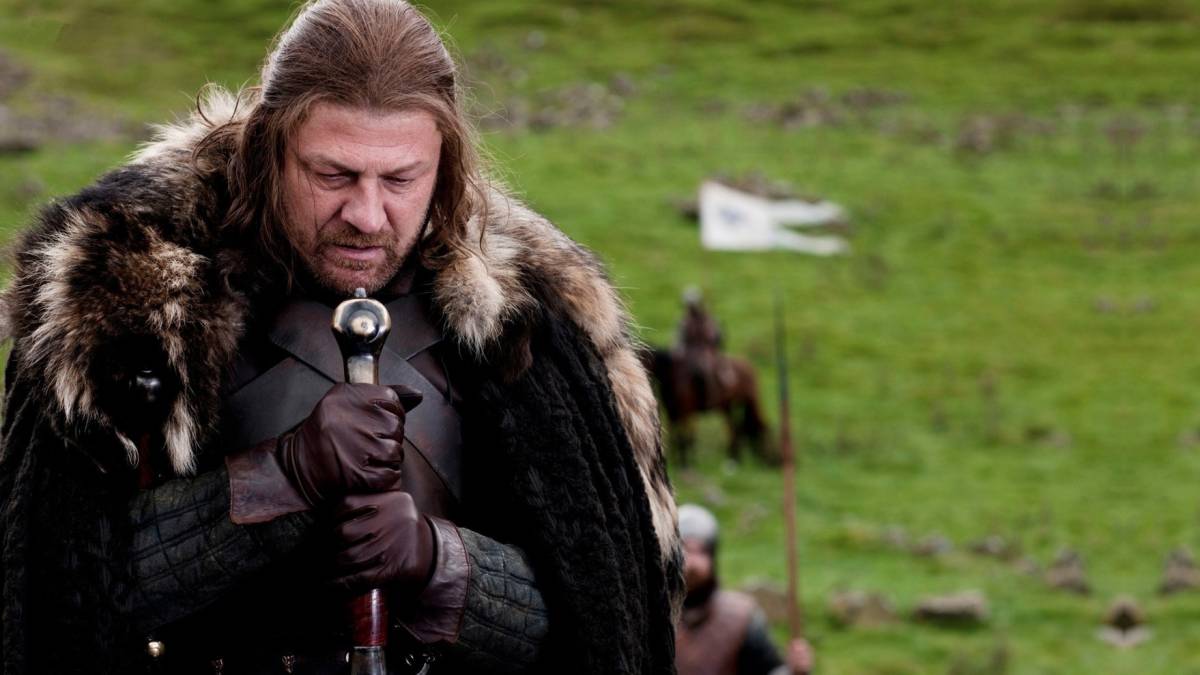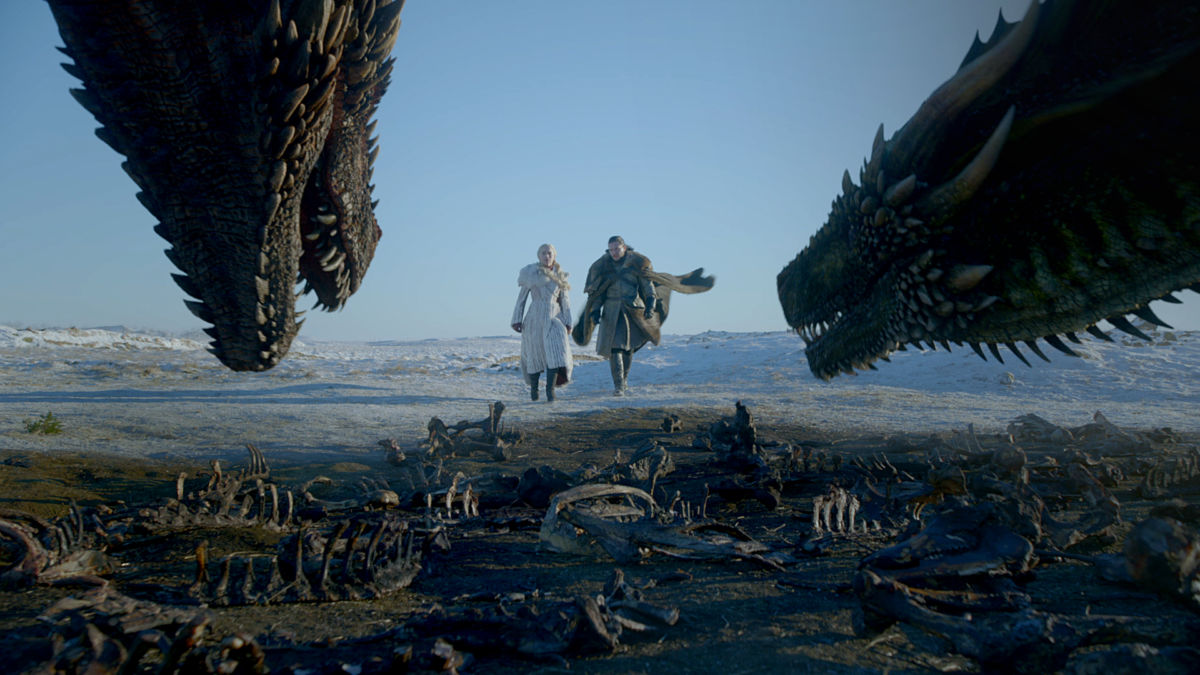“Once in a great while, we are privileged to experience a television event so extraordinary, it becomes part of our shared heritage. 1969: Man walks on the moon. 1971: Man walks on the moon…again. Then, for a long time, nothing happened. Until tonight…”
– Krusty the Klown
The old harlequin might have scanted the summer of ‘Who Shot JR?’, and The Sopranos’ final crushing cut to black, but nonetheless he was onto something. Thanks to streaming services it’s no longer a matter of the entire nation tuning in at the same time – and, by extension, always remembering where they were when JR was shot – but while the medium of television might have been diluted, it can still manage ripple effects in the wider culture. Speaking of The Sopranos, it was of course that show which kicked off the current golden age of hour-long TV drama (as well as the trend of villain protagonists, but that’s a story for another day), but neither that, nor the era’s various other best-TV-shows-ever like The Wire and Breaking Bad, ever met with the stratospheric mainstream success of HBO’s golden boy, Game of Thrones.
Statistically, you already know this. Even if you haven’t watched the show, even if you don’t go in for the water-cooler talk about what’s on TV, it’ll have slipped into your consciousness in a hundred insidious little ways – most likely a ‘winter is coming’ meme, but by no means limited to that. Language app Duolingo, for instance, spent the last year regularly suggesting its users ‘brush up on (their) High Valyrian for when Game Of Thrones returns’. This was a fool’s errand considering that all the major players were back in the common-tongued Westeros, but the point remains, Thrones represented such a cultural presence that Duolingo will randomly name-drop it to look good by association.
And now one of TV’s biggest draws has simply…ended. Not that we didn’t know this was coming, of course. It’s not the kind of show where you can simply keep churning out episodes until people lose interest – although there’s supposedly spinoffs in the works, like what Better Call Saul was to Breaking Bad – and George R.R. Martin always had a rough plan for the beginning, middle, and end of the narrative. Nonetheless, it’s going to leave a big hole, so you can expect a run of other lewd fantasy programmes, including the spinoffs, in an attempt to fill that. We’ve already seen a bit of this, with shows like Vikings and Black Sails popping up with the same kind of swords-and-sex idiom.
Of course, this won’t work. Success breeds imitators, but success itself is invariably something conventional wisdom wouldn’t have expected. If it was any other way, then Game of Thrones would have sprung up in the shadow of Peter Jackson’s Lord of the Rings films, rather than nearly ten years later. True to form, Jackson’s less successful The Hobbit trilogy started a year after Thrones did.

Further, the swords and the sex were basically window dressing to a show with excellent writing, tight plotting, and impeccable production values. But if the first season got its hooks in people – and it did, very quickly – the second raised it to must-watch TV, in particular with its ninth episode, ‘Blackwater’, the first of the show’s major set-piece battles and directed by the redoubtable Neil Marshall to Hollywood standards. The main complaint in these early days was that there were simply too many characters to keep track of – a laughable idea to anyone who watched The Wire, whose similarly sprawling cast didn’t even have the advantage of theme tunes and handy-dandy heraldry.
But it would be improper to recount Game of Thrones’s story without noting the fact that – infuriatingly, for the geeks who read the books – the show provided increasingly diminishing returns as its narrative passed the source material, which became especially insulting as the fans reluctantly accepted that the show would conclude long before the books ever would. This wasn’t entirely down to George R.R. Martin’s glacial writing pace, as he was still turning out material, including scripts for the show. Just, seemingly, anything other than the still-yet-to-be-released sixth book. This finally boiled over into outright dissent with the eighth and last season, but all the clues were there for anyone willing to see them.
So, with the show adrift from its moorings, the plotlines became at best conventional, at worst confused, and increasingly appeared to be trying to ape its moments of glory without understanding what made them good. In season one, Littlefinger betraying Ned broke people’s hearts. Come season five, Ramsay suddenly stabbing Osha, or Ellaria suddenly stabbing Doran, seemed like little more than Thrones’s contractually obliged surprise murder of the week. The showrunners certainly understood that people being unexpectedly ganked made good TV, but didn’t seem too clear on why.
Even when they still had book material to work with, deviations from it tended to coincide with the quality taking a sharp dip – the fourth book, A Feast For Crows, divided the fanbase somewhat, but nowhere near so much as the show divided up that book’s plotlines, throwing them in piecemeal all the way up into the sixth season. The shakiest parts still drawing directly on the books were the Dorne plotline, and Sansa marrying Ramsay. The latter was incredibly controversial at the time, but a lot of the criticism was misinterpreted as people being angry the show depicted a rape, rather than people being angry that it made no sense. In this case that ultimately came down to Sansa’s book plotline being scrapped, in favour of shoehorning her into Theon’s.

It must be said, there was the occasional deviation from the source material which worked incredibly well. Ned and Jaime facing off against each other in the streets of King’s Landing, and then being so rudely interrupted, seemed so natural it’s hard to believe that section of the book doesn’t go down the same way. Meanwhile, having Arya and Tywin share scenes through season 2 may not have made complete sense in-universe, but did make excellent television. It was a risk putting Maisie Williams – then all of fourteen years old – opposite a well-established star like Charles Dance, a risk which paid off, and the showrunners deserve credit for taking it.
(Though if you wanted to get your knives out, you might well ask why Game of Thrones couldn’t keep up that level of quality when it surpassed the books.)
Lord of the Rings was of course also a series of book adaptations, and did have the advantage of complete source material, but even so, the biggest complaint anyone had about the way that was adapted was the absence of a minor character called Tom Bombadil, who sang songs about being called Tom Bombadil. They too could so easily have succumbed to the temptation to make it a bit more crowd-pleasing, adding a nipple here and a grisly murder there. This may sound like buttoned-up PG-13 snobbery, but if anything, I’m suggesting Game of Thrones’s more lurid approach worked better on the open market. Lord of the Rings, despite its success, remained very firmly on the ‘genre’ side of the fence. Thrones hit the mainstream in a way Rings simply didn’t.
The proof of the pudding there comes from the way real-life public figures responded to it. Barack Obama was photographed sitting on the Iron Throne, Hillary Clinton compared herself to – of all characters – Cersei Lannister, and even Her Majesty Elizabeth the Second, by the Grace of God, of the United Kingdom of Great Britain and Northern Ireland and of Her other Realms and Territories Queen, Head of the Commonwealth, Defender of the Faith, squeezed a Game of Thrones reference into her 2014 Christmas speech after she’d visited the set earlier that year. (Unlike Obama, Big Liz was obliged not to grace the Iron Throne, as there are laws against the British monarch sitting the throne of a foreign power.) Again, it’s such a cultural presence that all these figures, all fairly secure in their power and position, wanted a bite of that bandwagon.
On the other end of the real-life response is of course the vox populi, the voice of the people, and the irony here is that this very voice was deliberately and systematically pressured into silence. I’m not talking about censorship, but rather spoilers, and how dropping them became, for a little while, completely beyond the pale. In the leadup to the final season of Thrones, coming out alongside Avengers: Endgame (the culmination of a good eleven years of incredibly successful Marvel adaptations), unmarked spoilers for either were considered more shocking and taboo than most curse words. If you really wanted to hurt someone, then your go-to option wouldn’t be to strike them or make vulgar suggestions about their mother, instead you’d spoil one of these popular works of fiction. It’d be a clear improvement if we hadn’t mutually decided to take it all so very seriously.
However, those unhappy few who did have the final season spoilt were first on another bandwagon – the ‘now it sucks’ camp. The vast majority of its audience were praising it to the rafters until, suddenly, they weren’t. There had been a degree of criticism of the show before, but this was largely limited to particularly egregious plotlines, whereas come the eighth season a lot of people thought the spoilers were bunkum on the basis that they sounded unbelievably bad. Many HBO series’ before Thrones have been slow-burners, but Thrones, more than most, was selling itself on the idea that when the climax came, it would be earth-shattering.
(A concept nicely parodied by South Park all the way back in 2013, when they depicted George R.R. Martin bouncing around, insisting there was something awesome on the way, which obliged everyone listening to sit through his extended and over-excited descriptions of the characters’ penises.)
But then the climax came, and it turned out that the years’ worth of what was supposedly treading water had been markedly superior, and all the stuff we’d been looking forward to fizzled shamefully out. Two-thirds of the dragons were paper tigers, the existential threat to all warm-blooded life on earth was neatly disposed of in a single episode, and, uh-oh, one of the good guys was a bad guy all along. All the production values in the world couldn’t make that mess better than Charles Dance and Diana Rigg, sitting in a room, acting.
Thrones, like the books it was based on, always prided itself on subverting genre expectations, with the first and most dramatic example being Ned Stark’s short and unhappy character arc. He was built up as both the image of the good noble, and also our main protagonist. Surely he’s going to win in the end. Surely he’s going to blow this whole corrupt conspiracy wide open. Surely, we declared a little desperately as he was led to the block, he’s going to be saved at the last second, even if he is played by Sean Bean.
But no. Ned lost his head, and then our replacement protagonist Robb, his son and heir, made it until season 3 in his quest for revenge before grim feudal realpolitik caught up with him too. This was characterised by some nameless but insightful online commentator as ‘the show not cheating to help the good guys’ – contra so many works of fiction in which characters are saved at the last second, where the cavalry arrives, the king issues a reprieve, the eagles turn up to fly everyone to safety, something like that. On Thrones, people faced consequences – often violent and bloody ones – for their actions.

Or at least, they did. That commentator went on to describe the main sea change we saw in the show – specifically, that it went from ‘not cheating to help the good guys’, to ‘cheating to help the bad guys’. Tywin and Joffrey didn’t suffer from this so much, but Iwan Rheon’s Ramsay, official villain of the second act, pinballed randomly from victory to victory, surviving knife fights while half-naked and seemingly just out to be a turd to every other person he saw. Then we had the Night King, who despite being made out of winter turned out to be immune to fire. And Cersei, who turned out to be the overarching villain of the whole show, had good enough PR that nobody minded when she blew up a large section of the capital.
There was also the fact that the writers clearly favoured some characters more than others. Sansa, as unapologetically girly-girl, got the rough end of this from the fanbase ever since the first book was published. Stannis had his character assassinated before actually being assassinated – a disservice to Stephen Dillane, who despite being somewhere between dismissive and scornful of the project, put in a standout performance. But probably the greatest example was Barristan, killed off mainly because Ian McElhinney, a fan of the books, was willing to call David Benioff and D.B. Weiss on their poor decisions. It would be easy to dismiss McElhinney as a dilettantish actor who believed he knew better than the writers, as indeed many did at the time, but where the narrative subsequently went would seem to have vindicated him pretty well.
By contrast, the writers seemed to like Tyrion too much, if anything. And perversely, it was killing his father and his lover in cold blood which signalled his transformation into a man who, apparently, could do no wrong. Peter Dinklage did provide an excellent and consistently likable performance, but the man’s popularity seemed to bleed into the plotting. All nuance was abandoned in favour of everyone gathering round to praise Tyrion, and him belting out little sub-koans like ‘I drink and I know things’. But even Tyrion’s hagiography can’t quite compare with Jon Snow and his impregnable plot armour. One season 7 episode saw him getting deus-ex-machina’d out of certain death twice in little more than ten minutes, and you just started to wonder ‘wait, isn’t this the same show that didn’t have Ned Stark get saved in the nick of time?’ Yes, yes it is, but it seems to have lost its way.
It’s rightly said that the deepest hate is that which follows great love. You see this every day, when people open their mouths to sound off about their awful exes. In the same way, the incredibly strong early seasons of Game of Thrones meant it had that much further to fall. Had it presented us with by-the-numbers dialogue and shaky plotting the whole way through, you wouldn’t be seeing the kind of backlash that the final season prompted.

Honestly, there’s a strong argument to be made for judging the first and second halves of Game of Thrones separately. Even the most enthusiastic fans could point to a distinct change between seasons 4 and 5. And there is precedent for that sort of thing. The Dead Homer Society draws a clear line between ‘The Simpsons’ (beloved animated comedy) and ‘Zombie Simpsons’ (soulless cash-grab). But doing so in what has, for the past few thousand words, been a review of the whole thing would feel distinctly like kicking the can.
There’s a specific category of media I’ve always conceived of in the same way as Frank Miller’s The Dark Knight Returns. This was the first Batman story to go properly ‘90s-era gritty and grimdark, a quality which never quite left the franchise after that. It also contains a series of Miller’s typically deranged asides, including the Joker’s main henchwoman being a neo-Nazi with Swastika pasties. To put it simply, it is more famous and better-regarded for the impact it had on the wider culture, rather than as a work in and of itself.
The same seems to be true of Game of Thrones. Judged purely on quality, it will inevitably go down in history as a fairly mixed bag, but it has forcibly thrust epic fantasy into the mainstream. More broadly, it’s shown that there’s a mainstream market for stuff which would have been dismissed as nerdy nonsense not too long ago. Once Game of Thrones carved open that niche, we saw television graced by stuff like Westworld, The Borgias, and The Expanse (another adaptation of a distinctly nerdy book series) – all of which also found themselves with mainstream clout, rather than being consigned to the genre ghetto. For that alone it’s a televisual milestone.
Some of the coverage you find on Cultured Vultures contains affiliate links, which provide us with small commissions based on purchases made from visiting our site.

